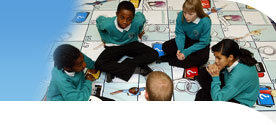



The key concepts and key processes for citizenship provide a context for developing pupils' personal, learning and thinking skills (PLTS).
This involves understanding the underpinning values and processes upon which our society is based, including freedom, fairness and equality before the law. Such an understanding requires independent enquirers and effective participators who are able to make judgements about the extent to which decisions, action and opinions reflect these important values.
This involves recognising one's own role within a free and democratic society, including the extent to which action should be constrained, or should be encouraged. It requires reflective learners and self-managers who are able to judge the appropriateness of responsible action, and creative thinkers who can formulate a legitimate response when rights have been infringed.
This involves exploring how ideas, experiences and values can be similar and different in a range of cultures and traditions. This requires independent enquirers and reflective learners who are able to explore issues, problems or events from different perspectives and who can demonstrate toleration and respect for opinions and ideas that are different to their own.
This calls for pupils to develop their own views and ideas, and be able to analyse and evaluate those of others using a wide range of sources. It requires reflective learners who are able assess themselves and others, and independent enquirers who are able to look at information and judge its relevance and value. Developing young people's ability to use imagination and make connections between concepts and actions requires creative thinkers who can generate ideas and explore possibilities, connect their own and others' ideas and experiences in inventive ways, and try out alternatives and new solutions.
This requires team workers, self-managers and effective participators who can work cooperatively with others to try to have influence, make change or resist unwanted change in response to political and social issues and problems affecting individuals and communities.
This involves the ability to make choices about effective ways to argue, persuade and represent viewpoints formally and informally. It requires creative thinkers who can adapt ideas as circumstances change and reflective learners who are able to communicate their ideas and learning in relevant ways for different audiences.
With thoughtful planning, a range of PLTS can be embedded in any sequence of work. For example, pupils might be asked to prepare a group presentation on an issue of local importance over several lessons. This would involve pupils: